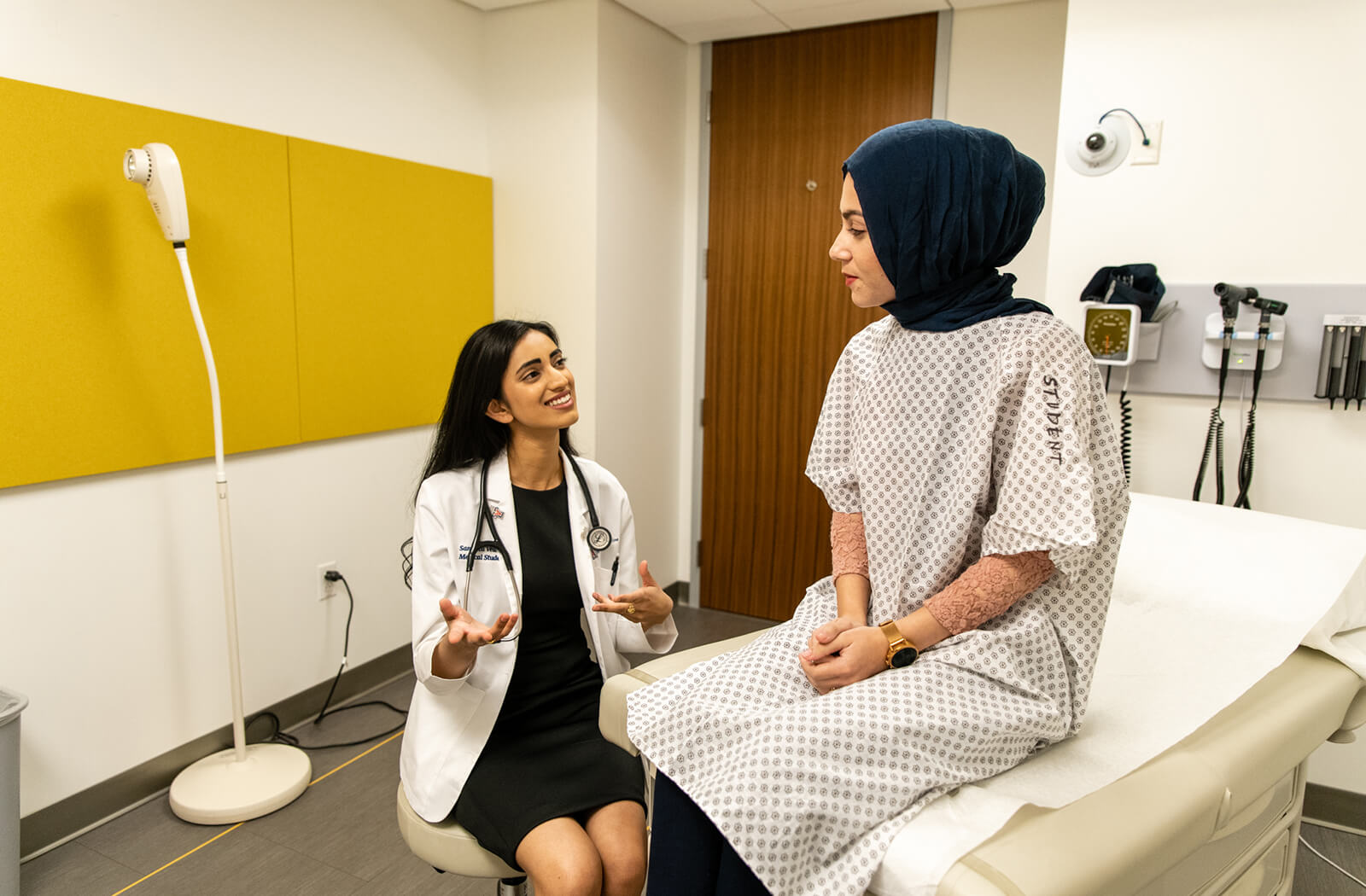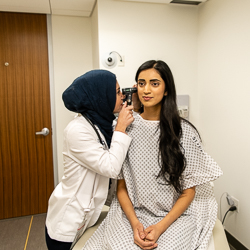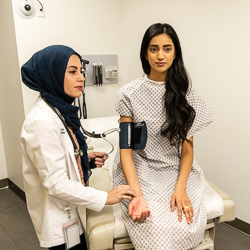
Standardized Patients Key to Training Empathetic Doctors

Marícela Moffitt, MD, MPH, is training students at the University of Arizona College of Medicine – Phoenix to be empathetic doctors by teaching them how to take a thorough patient history and physical examination, how to ask patients difficult questions in a non-confrontational way, to hone their critical-thinking skills so they can diagnosis an illness and to deliver bad news gently to a patient with a terminal illness diagnosis.

Key to the effectiveness of the introductory course is the immediate feedback students receive not only from faculty, but from the college’s stable of more than 100 standardized patients.
Standardized Patients (SPs) are part-time University of Arizona employees who have been coached to exhibit a scripted set of symptoms. After training that lasts up to two months, they are placed in a simulated doctor’s office, where medical students evaluate them, diagnose their symptoms and attempt to make an emotional connection with them.
“It’s important for students to have these experiences because it’s easy to look at a book; but when you’re dealing with human nature, there’s going to be different things that are triggered,” said Lillie Richardson, who has been a standardized patient for four years. “A person has real feelings, real issues and they are unique to everyone.”
The medical school is always looking for more standardized patients. Dr. Moffitt, who has taught the class since 2012, said she would like to have a pool of 300 trained SPs.
“The pool is so small that when we have exams, I don’t have enough good SPs to pull from,” Dr. Moffitt said. They look for people to train who are “near normal” physically and the pay is $20 an hour. Applicants must be available flexible hours from 9:00 a.m. to 5:00 p.m. Monday through Friday and must undergo a criminal background check.

The SPs are key to medical school training because they allow students to hone their communication and diagnostic skills.
“I’ve been on the other side of the bed, so I know what it’s like to have a doctor that doesn’t communicate really well,” said Dr. Moffitt. “That’s what we are really trying to fix here. To get students comfortable in their own skin and so that they can really connect with this person, we teach emotion validation. It’s a simple skill, but it’s worth it.”
Students are taught how to frame an opening sentence and ask questions strategically, in a non-confrontational way and without judgment. So instead of asking “Do you smoke,” they are trained to ask: “Have you ever used tobacco products?” And “Are you using medication that doesn’t belong to you” or “Do your friends use drugs” instead of “Do you use drugs?”
“In every session of the doctoring course when students interact with an SP, they are working on their communication skills and are taught to do an emotion validation,” Dr. Moffitt said. “The hope is that the habits created here at the UA carry on.”
Dr. Moffitt said it is more than a hope that U of A College of Medicine – Phoenix students arrive for their third-year clerkships and post-graduation residencies well prepared.
“We know they are better prepared than other medical students because the physicians tell us they are,” Dr. Moffitt said.
Topics
About the College
Founded in 2007, the University of Arizona College of Medicine – Phoenix inspires and trains exemplary physicians, scientists and leaders to advance its core missions in education, research, clinical care and service to communities across Arizona. The college’s strength lies in our collaborations and partnerships with clinical affiliates, community organizations and industry sponsors. With our primary affiliate, Banner Health, we are recognized as the premier academic medical center in Phoenix. As an anchor institution of the Phoenix Bioscience Core, the college is home to signature research programs in neurosciences, cardiopulmonary diseases, immunology, informatics and metabolism. These focus areas uniquely position us to drive biomedical research and bolster economic development in the region.
As an urban institution with strong roots in rural and tribal health, the college has graduated more than 1,000 physicians and matriculates 130 students each year. Greater than 60% of matriculating students are from Arizona and many continue training at our GME sponsored residency programs, ultimately pursuing local academic and community-based opportunities. While our traditional four-year program continues to thrive, we will launch our recently approved accelerated three-year medical student curriculum with exclusive focus on primary care. This program is designed to further enhance workforce retention needs across Arizona.
The college has embarked on our strategic plan for 2025 to 2030. Learn more.